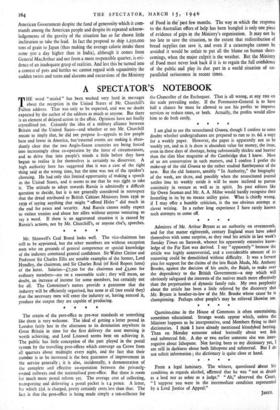A SPECTATOR 'S NOTEBOOK
THE word "mixed " has been worked very hard in messages about the reception in the United States of Mr. Churchill's Fulton address. That was only to be expected, and was no doubt expected by the author of the address as much as anyone. But there is an element of delayed action in the affair. Opinions have not finally crystallised yet. Certainly the idea of a military alliance between Britain and the United States—and whether or not Mr. Churchill meant to imply that, he did not propose it—appeals to few people here and fewer in America, but-external events are making it abun- dantly clear that the two Anglo-Saxon countries are being forced into increasingly close co-operation by the force of circumstances, and to drive that into people's minds a little before they have begun to realise it for themselves is certainly no disservice. A high authority here has suggested that it was a case of the right thing said at the wrong time, but the time was not of the speaker's choosing. He had only this limited opportunity of making a speech in the United States, and it seems to me that he was right to take it. The attitude to adopt towards Russia is admittedly a difficult question to decide, but it is not generally considered in retrospect that the dread attributed to British Cabinet Ministers from 1936 to 1939 of saying anything that might " offend Hitler " did much in the end for peace and security. And Russia cannot really expect to violate treaties and abuse her allies without anyone venturing to say a word. If there is an aggravated situation it is caused by Russia's actions, not by Mr. Churchill's, or anyone else's, speeches.


























 Previous page
Previous page